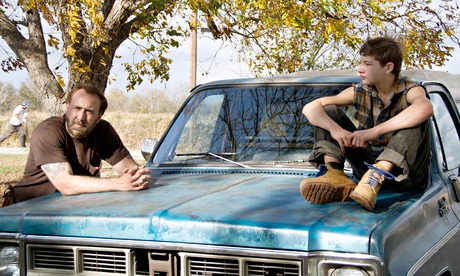
Here is a seething piece of social-realist Southern gothic, featuring a powerful performance from a big and broodingly bearded Nicolas Cage. It's a film that also appears to mark the end of the weirdest auteur-detour in modern movie history.
In 2000, the then 25-year-old director David Gordon Green released his first movie, George Washington, a luminous, unhurried, gorgeously photographed coming-of-age picture set in North Carolina which seemed to announce him as the heir to Terrence Malick.His followup features did little to change that impression. Here was a deeply serious film-maker with a genuine sense of the spiritual.
Then something freaky happened. Green took a sudden left turn into broad fratpacker comedy, giving us the stoner adventure Pineapple Express (2008), the cod-medieval spoof Your Highness (2011) and an episode or two of the Danny McBride HBO TV comedy Eastbound and Down. Really, hardly any of the authorial signature of his earlier phase was present in these commercial romps, and they so dismayed and affronted many critics that some dismissed this new direction as evidence of a brain tumour. I myself was as startled as everyone else, though not offended, and I thought Your Highness was funny and much underrated. And actually, there is a residually "serious" moment in Pineapple Express: when the two guys begin to get high, the mood and tempo shifts, briefly, to Gordon's previous, quasi-visionary manner. Now, with this latest film, Green has fully rediscovered his first, Malickian, style – though there is, interestingly, a tiny hint of wackiness.
Joe is slow cinema, or at least slower than the quick-fire world of comedy Green has left behind. So perhaps this really is his true style; or perhaps it is comedy that will turn out to have been his real vocation. Either way, it should be said that slow cinema is no more real than fast cinema, no more real than the frantically paced editing of superhero movies or action thrillers. It is another artificial convention, but one that makes Joe such an effective and absorbing movie.
Green has found exactly the right actor to bring him back to a more contemplative style: Nicolas Cage, that great, horse-faced player who possesses a sense of both the extravagant and the absurd that makes him castable in both serious pictures and comedies. (He could easily have been in Your Highness.)
He plays Joe, a big guy who has done a little jail time for assaulting a police officer, and still gets into fights, but is now semi-reformed, and has a responsible position managing a crew of workers in the deforestation business. His job is clearing woodland by first injecting poison into the trees that need to be removed, using a special chemical-dispensing hatchet. There could hardly be a more poignant symbol for this film's unsentimental and yet fully engaged approach to the natural world: poisoning trees. Joe is unmarried, is devoted to his mean dog, has an on-off girlfriend, visits the local whorehouse (whose own mean dog he very much resents) and just gets around. The movie roams around with him with an easy swing.
But Joe is on the verge of some kind of self-questioning crisis, which is accelerated when a kid asks him for work. This kid is Gary (very well played by Tye Sheridan, who was a comparable youngster in Jeff Nichols's Mud, and Terrence Malick's The Tree of Life). He is a dirt-poor but hard-working and personable boy, being abused by his violent dad, Wade, who is remarkably played by non-professional actor Gary Poulter – a once-homeless man recruited specifically for this movie. Joe senses he could be a father figure to Gary.
Cage carries the movie, with admirable support from Sheridan. And they do indeed have a "funny" scene when quasi-father and pseudo-son take off together, drunk, and Joe appears to mentor Gary in how to attract women and how to look fascinating: how, for example, to look like you're smiling through some inner emotional pain. Was Cage doing some improvisation, based on acting tricks of his own? It's a very funny moment, which actually deepens the rest of the film.
Fans of Cage are always on the alert for this actor's tendency to pump up the volume. There is no sudden shouting here, but a very Cagean histrionic flash, when he fearlessly (and again, symbolically) grabs a deadly snake by the neck and shows off its gaping fangs to his cowering, sniggering men. He himself has real bite, and so does this film.

